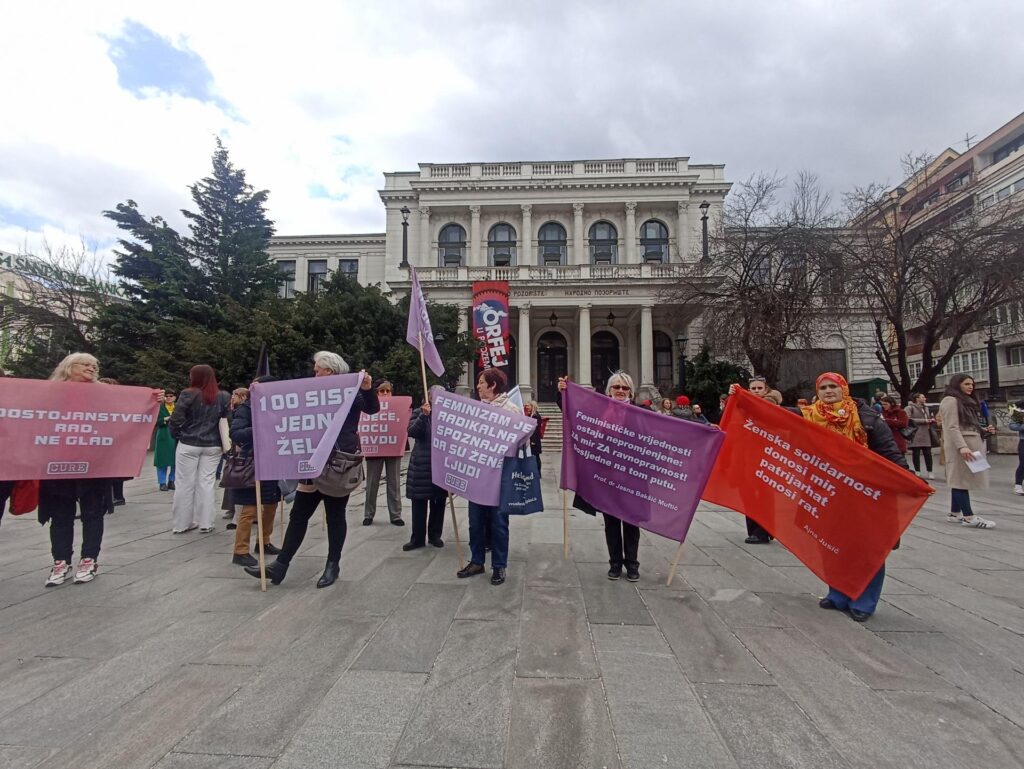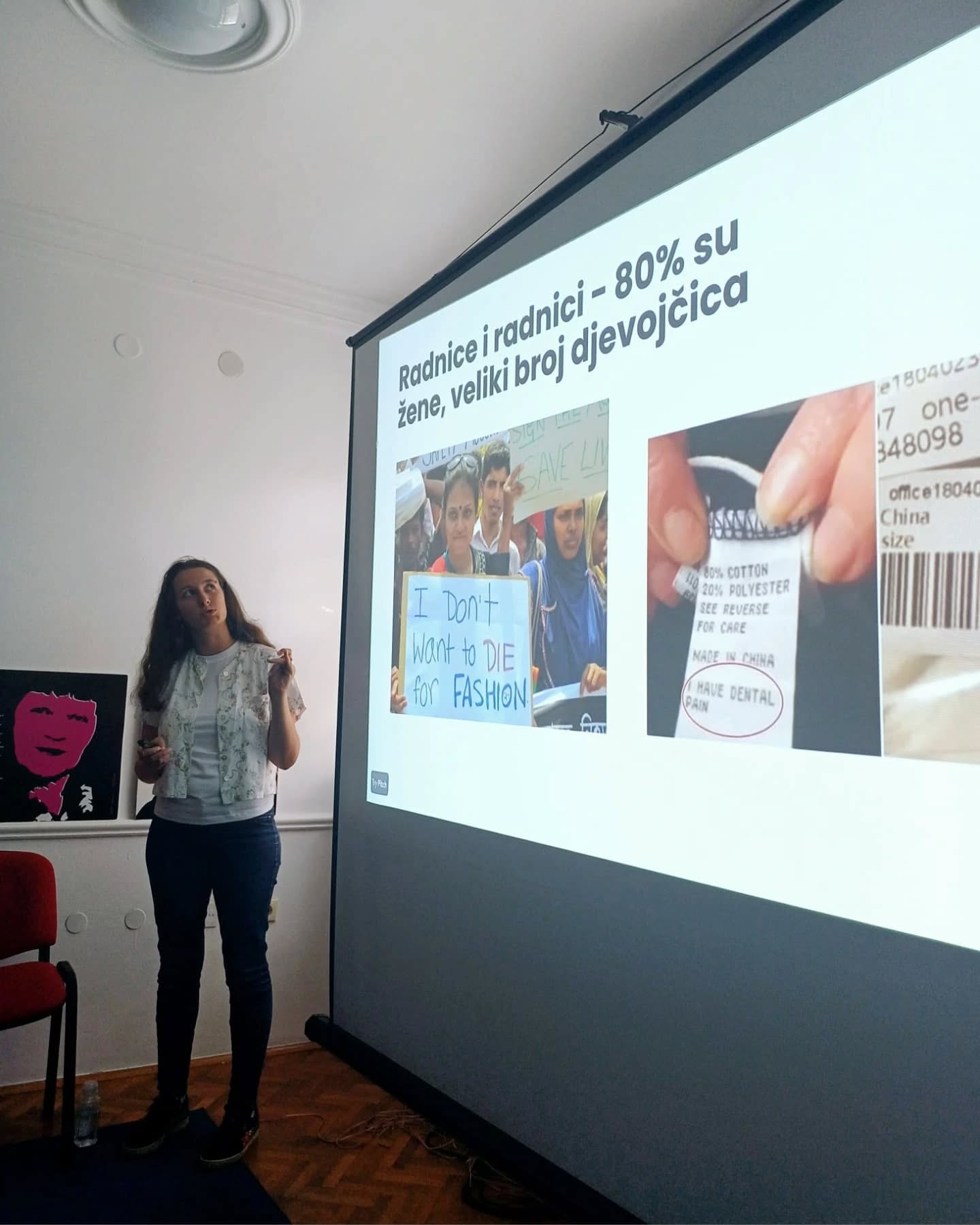We investigated how the highest legal act of the state treats the issue of gender equality in Bosnia and Herzegovina
The Constitution is the highest and fundamental legal act of the state, which establishes the political and legal order. All other legal acts are based on constitutions. In times when we are (and still are) witnessing the rise of fascist narratives, the discrimination of all who are different, and the rise of violence in all forms, we checked how the constitutions in the region treat women and the issue of gender equality.
QUALITATIVE EQUALITY
The Constitution of Bosnia and Herzegovina is part of the General Framework Agreement for Peace, i.e. the Dayton Peace Agreement. It was created and signed almost 28 years ago to stop the bloodshed. The Constitution of BiH does not recognize the gender language. In Article II which refers to human rights and fundamental freedoms, under point 4. Non-discrimination, it is stated that “the enjoyment of the rights and freedoms provided for in this article or in the international agreements listed in Annex I of this Constitution is ensured to all persons in BiH without discrimination on any basis such as sex, race, color, language, religion, political and other opinion, national or social origin, association with a national minority, property, birth or other status”. In Annex I, which includes additional agreements on human rights that will be applied in BiH, there are two conventions that directly concern women – on the citizenship of married women and on the elimination of all forms of discrimination against women.
From the Agency for Gender Equality of the Ministry of Human Rights and Refugees of BiH, they emphasize that it is extremely important to talk about gender equality, because it does not only refer to the rights of women, but also to the rights of men, to their different needs, to the quality of relationships and roles that have in society, which are conditioned by different factors.
The development of society is impossible without respect for gender equality, primarily in the sense of supporting the development of the full potential of both men and women
– Gender equality is a basic condition for achieving civil, cultural, economic, political and social rights. This implies conditions in which women and men have equal opportunities to live and work, and to have equal benefits, that is, to equally share the profits from the activities in which they participate, they state.
They add that “equality does not only mean the inclusion of an equal number of women and men – quantitative equality, but also implies the inclusion of women’s and men’s interests in development programs in all political, economic and social spheres, so that the welfare of women and men is equal – qualitative equality”.
– The development of society is impossible without respect for gender equality, primarily in terms of supporting the development of the full potential of both men and women, they say.
Various analyses, according to the ARS BiH, have shown that many constitutions lack a provision on gender equality, although the inclusion of this principle can strengthen the achievement of equality or even become a basic principle.
– The gender aspect is a relatively new element in modern constitutions, but it should, in a broader sense, be understood as a democratic principle that implies the achievement of gender equality and human dignity of all men and women, boys and girls. The historically less favorable position of women compared to men requires the inclusion of affirmative measures of gender equality, and in this way ensure priority over other regulations in the constitutional provisions. However, in this sense, affirmative measures that directly enable the application of gender equality are indispensable, especially in areas such as access to education, employment, and political participation, they emphasize.
They remind that the Constitution of BiH prohibits discrimination, and that non-discrimination is one of the most important constitutional principles.
– The Constitution of BiH guarantees the highest level of internationally recognized human rights and fundamental freedoms by incorporating 15 of the most important instruments for the protection of human rights, including the UN Convention on the Elimination of All Forms of Discrimination against Women (CEDAW Convention). Also, the rights and freedoms guaranteed by the European Convention for the Protection of Human Rights and Fundamental Freedoms, as well as its protocols, are directly applied in BiH. There are almost no countries in the world where CEDAW is part of the constitution, and for this reason it is particularly important to raise awareness of CEDAW standards and to apply them directly in BiH. International documents that are part of the Constitution of BiH oblige to ensure the equal position of women and men in all areas of social and private life, the Agency says.
They point out that it is possible to find data indicating that the Constitution of Serbia contains a statement on gender equality and the prohibition of discrimination, and that it contains affirmative measures aimed at improving gender equality. The Constitution of the Republic of Croatia contains the principle of gender-based affirmative measures, as does the Constitution of Montenegro.
– So far, numerous activities have been carried out, analyses, planned amendments to the Constitution of BiH, submitted initiatives and recommendations, but… As pointed out in the Initiaitve Women Citizens for Constitutional Reform, it is necessary to continue with the activities. The goal is to ensure greater protection of human rights and freedoms, with a special focus on the gender perspective. The Initiative was formed by activists and organizations from all over BiH, who want to encourage all citizens to use their knowledge, energy and willingness to work together and contribute to the fulfillment of the Initiative’s goals. In parallel with these activities, the promotion and implementation of the Law on Gender Equality in BiH should be continued even more strongly, they recommend from the ARS of BiH.
Mirjana Marinković-Lepić, the first female Speaker of the House of Representatives of the Parliament of the Federation of BiH, emphasizes that more than half of the population is made up of women.
– On the one hand, we, women, must make ourselves equal to men, and on the other hand, we must release the potential we have for overall social progress, says Marinković-Lepić.

She notes that constitutions most often imply gender equality, but, unfortunately, it is often not understood by the interpreters of the constitution, nor by those who are in charge of ensuring the application of the constitution and their respect.
– That’s why we have to fight for less and less things to be implied, and more and more explicitly stated, so that we can be more sure of their compliance and implementation. From gender-sensitive language to the gender rights specifically mentioned in the constitution, she warns.
She emphasizes that in different periods we had different successes and defeats of retrograde policies.
– As far as gender equality is concerned, the situation is better in the EU countries than in the countries of the region, although we have political voices there, extremely strong, who, under the guise of protecting traditional values, insist on a patriarchal social structure, which would threaten the areas of women’s freedom that women conquered with painstaking effort and with great sacrifices. It all comes down to a matter of choice – who do people vote for. You need a majority in every parliament to change something. If you do not choose those who promise you an increase in gender equality, respect for women’s rights and the like, this will hardly happen. Maybe by some other ways, but certainly not parliamentary ones. There is a problem, why people, including, of course, women, choose those who threaten their rights, Mirjana Marinković-Lepić believes.
She explains that the constitution needs to be changed through the parliament.
– The procedure is known. We come again to who sits in the parliaments, whom the citizens elected. Our Party, to which I belong, certainly has the most initiatives, proposals, questions and discussions at different levels of government that directly relate to or are related to gender equality. I dedicated a good part of my political work to gender equality. And mostly through the state Parliament. Two of us from Our Party were elected to that Parliament at the beginning of the last mandate. The mandate has passed, two from Our Party were elected again. Of course, we will not give up in that fight, even if no one was elected, but without people who fight for it through the parliaments, it will be difficult for us to reach a gender-equal constitution, warns Marinković-Lepić.
Alma Kratina, a member of the Federal Parliament, points out that the issue of gender equality is a matter of the prosperity of society as a whole, and that it is necessary to influence public awareness, given that women are still underrepresented in decision-making positions.

– The fact that we have the Law on Gender Equality, the Law on Prevention of All Forms of Discrimination, ratified international conventions, is clearly not enough in itself to witness the opportunity for equal opportunities for women and men. It is completely clear that the introduction of affirmative measures into the Constitution of BiH is necessary to achieve gender equality, because the Constitution does not explicitly prescribe gender equality, which opens up space for inequality and marginalization of women in important spheres of life, says Kratina.
He notes that, among other things, the use of gender-responsive language in the text of the Constitution is extremely important in order to overcome discrimination and the invisibility of women in politics.
– The recommendations of the UN Committee for the Elimination of Discrimination against Women, which refer to BiH, say that it is necessary to enable the protection of equality and the absence of discrimination in public and private spheres of life. As the Constitution of BiH is discriminatory, which was also confirmed by the verdicts of the European Court of Human Rights in the cases of Sejdić-Finci, Šlaku, Pilav, Zornić, and since there has been no political will to amend the Constitution for more than a decade, it is completely clear that the big challenge is also the introduction of affirmative measures in the Constitution, in order to provide equal opportunities for women and men, Kratina points out.
She emphasizes that in the countries of the region, the issue of gender equality is better resolved through the Constitution.
– It is encouraging that concrete initiatives in the direction of defining constitutional changes, which would mean the protection of equality and the abolition of discrimination, initiated by NGOs, ARS BiH, the Gender Center of the FBIH, have been communicated with the commissions in the state and federal Parliament and that these issues are intensively discussed, without regardless of all other open issues that need to be solved urgently, the federal deputy believes and adds that the way to abolish the underrepresentation of women in decision-making positions, in the legislative and executive authorities, but also in all segments of life, is certainly the visibility of women in the Constitution of BiH.
She believes that it is necessary to introduce affirmative measures that would pave the way to a gender-responsible society, ultimately, a prosperous society as a whole.
– Affirmative measures incorporated into the Constitution would mean an open space for reducing the dominance of men and the general inclusion of women in decision-making in places where important decisions are made for citizens and where conditions are created to correct injustices that have long been located in all systems, as health, social protection, and labor law. Therefore, interventions are needed on the constitution, both the Constitution of BiH and the entity constitutions, she emphasizes.
Denija Hidić from the Initiative Women Citizens fr Constitutional Reform believes that the establishment of gender equality is one of the key goals and priorities of the development of every modern society.
– Gender equality means equal visibility, empowerment and participation of both sexes in all spheres of public and private life and aims to promote the full participation of women and men in society. The constitution should be a space that, taking into account all the needs of society, defines, regulates and improves the social relations of men and women, as well as their relation to the state, but also the equal and the same relation of the state to all who live in it, says Hidić.

She explains that in the countries of the region, gender equality is one of the highest values of the constitutional order and one of the foundations for the interpretation of the Constitution.
– Unfortunately, in BiH we do not even have an approximate situation when we talk about gender equality, both in the fundamental legal act, the Constitution, from which we should derive gender equality, and also in secondary legal acts and documents. The issue of gender equality is completely excluded from the Constitution of BiH, the activist warns.
She emphasizes that the Republic of Croatia sees gender equality as the guiding principle for the interpretation of the Constitution, and that the Constitution contains affirmative measures.
– The Constitution of Serbia contains a statement on gender equality and the prohibition of discrimination. In addition, it contains affirmative measures aimed at improving gender equality and guarantees social and economic benefits. In the Constitution of Montenegro, we have affirmative measures. In BiH, the biggest problem in the context of constitutional changes is the non-implementation of the verdicts of the ECtHR, five of them at the state level, in connection with the discriminatory provisions of the Constitution of BiH, emphasizes Hidić and adds that women are completely invisible in the Constitution of BiH.
She emphasizes that it is unacceptable that the largest legal act of a country discriminates against women in this way and completely excludes them. The Initiative Women Citizens for Constitutional Reform advocates for the engendering of the constitution and the inclusion of women in the Constitution of BiH so that all citizens have equal rights and opportunities.
INTERFERENCE OF FAITH
– During the adoption of the Constitution of BiH, women were not at the negotiating table, they did not make decisions, and today there are not enough women even in the processes of European Integration, warns Hidić.
It is inadmissible for retrograde, nationalist, right-wing parties to decide on women’s bodies and to restrict women’s freedom
She adds that lately we have witnessed the growth of right-wing and retrograde and nationalist policies both in the region and in the European Union.
– There are different political currents that negatively affect women and the women’s movement. In Poland, there was a controversial, complete ban on abortion. It is inadmissible for retrograde, nationalist, right-wing parties to decide on women’s bodies, and to restrict women’s freedom. Sweden, a country known for its openness, feminist principles and the first feminist government, brought the far right as government last year. In addition to Sweden, today we also have the far right in power in Italy. The region also follows retrograde policies and today we have more and more interference of faith/religion in politics, says Hidić.
She believes that until constitutional changes become an important issue for political actors, real changes will be difficult to come by.
– Gender equality is also one of the pillars of human rights in any country that wants to be called democratic. The Law on Gender Equality clearly defines the obligations of all competent institutions. Decision-makers need a little more motivation and awareness of the importance of incorporating gender equality into the Constitution of BiH, in order to responsibly start implementing all the obligations that BiH has undertaken, which concern women’s rights and gender equality. BiH “on paper” has done a lot when it comes to equality, however, the situation in practice is far from ideal, emphasizes Hidić.
(The text was written in cooperation with the Initiative Women Citizens For Constitutional Reform. In the following Views, we talk about gender equality and the constitutions in the Republic of Croatia and the Republic of Serbia)
#USTAV BIH#LJUDSKA PRAVA#FONDACIJA CURE#ALMIRA MEHIĆ#ALMA KRATINA#MIRJANA MARINKOVIĆ LEPIĆ#NASAPRICA
Text was taken from: http://www.oslobodjenje.ba





